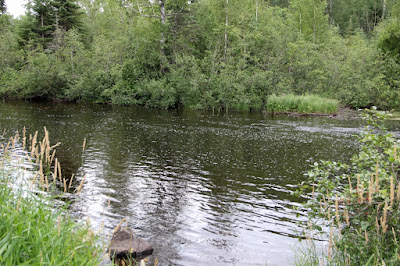I grew up reading Field & Stream, Outdoor Life, Sports Afield, and similar magazines. Some of my all-time favorite writing and writers arrived in those pages. Robert Ruark, The Old Man and the Boy, Gene Hill, Tailfeathers, Corey Ford, The Lower Forty, helped shape both my desires for outdoor adventures and the values by which I judged a successful day afield or a stream. There was, and still is, a great deal of wisdom and ethics embedded in that writing. Later, I became a lifetime subscriber to Gray’s Sporting Journal, which I still enjoy but preferred back in the days Ed Gray himself was in charge.
These days I’m really happy to see somewhat of a return to the kind of writing I grew up thriving on. The Bozeman Daily Chronicle has just [as of this writing] published an article on Connecting with conscience: Simms launches fishing movement centered on stewardship, responsibility. Trout Unlimited recently devoted an issue of TROUT magazine to the question of What are you really fishing for? Patagonia has a section of its web site devoted to fly-fishing and activism.
 |
| trout stream: a fine place to spend a July day
Photo by J. Harrington
|
It doesn’t matter if your preferred outdoor recreation is gardening, surfing, fishing, biking, hiking, hunting, boating, foraging, or .... We all depend on earth’s resources for food, shelter, recreation, clean air to breathe and water to drink. So will our descendants. I doubt that there will ever be enough laws and law enforcers to protect the resources on which we all depend. Take a look a how “well” we’re doing with the Clean Water Act goals.
As an alternative to depending on an insufficient legal framework, we could try being more reliant on an approach Aldo Leopold writes about in A Sand County Almanac, shaping a land ethic that has evolved “in the minds of a thinking community.” As we consider protecting resources, we must take account of another nonrenewable resource we often fail to value enough. This quote from Gene Hill may hit home.
Remember when time was cheap? The songs we sang about it told us that we had time on our hands, that time stood still, that tomorrow would be time enough. And now we find it was not. Suddenly times to come have become times past, and we must hoard it and spend it cautiously as the tag ends of a small inheritance . . . which is what it really was all along—except no one told us.
Hunting Manual
in the dark.The unicorn is an easy prey: its hornin the maiden’s lap is an obvioustwist, a tamed figure—like the hawkthat once roamed free, but sits now, fat and hooded,squawking on the hunter’s wrist. It’s easyto catch what no longer capturesthe mind, long since woven in,a faded tapestry on a crumbling wallmade by the women who wore keysat their waists and in their sleep camehot dreams of wounded knights left bleedingin their care, who would wake the next morninggroaning from the leftover lance in the groin,look up into the round blond face beaming downat them thinking "mine," and say: "angel."Such beasts are easy to catch; their dreamsbetray them. But the hard prey is the onethat won’t come bidden.By these signs you will know it:when you lift your lureout of the water, the long plastic linewill be missing its end: the lure and the hookwill be gone, and the line will swing freein the air, so light it will be withoutbait or its cunningsharp curl of silver. Or when you pullyour net from the stream, it will be eatenas if by acid, its fine mesh sodden shreds.Or when you go at dawn to check your traps,their great metal jaws will be wrenchedopen, the teeth blunt with rustas if they had lain for years in the rain.Or when the thunderstorm suddenly breaksin the summer, next morningthe computer’s memory will be blank.Look then for the blank card, the sprung trap,the net’s dissolve, the unburdenedline that swings free in the air.There. By day, go empty-handed to the huntand come home the same way
********************************************
Thanks for visiting. Come again when you can.
Please be kind to each other while you can.
No comments:
Post a Comment